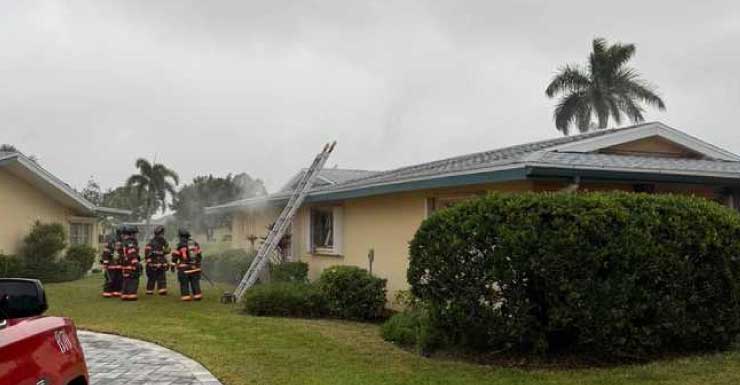18 Fla. L. Weekly Supp. 30a
Online Reference: FLWSUPP 1801LEHR
Insurance — Personal injury protection — Attorney’s fees — Prevailing party — Fee agreement — No abuse of discretion in assessing attorney’s fees against insurer without requiring prevailing medical provider to produce retainer agreement to ensure that fee award does not exceed fee agreement between provider and his attorney where no written fee agreement existed, and provider’s attorney agreed orally to collect attorney’s fees based on court’s determination in accordance with PIP statute
UNITED AUTOMOBILE INS. CO., Appellant, vs. DAVID G. LEHRMAN a/a/o MARVIN LOGUE, Appellee. Circuit Court, 11th Judicial Circuit (Appellate) in and for Miami-Dade County. Case No. 08-506 AP. L.T. Case No. 2005006149SP05. November 8, 2010. Counsel: Michael J. Neimand, for Appellant. Stuart B. Yonofsky, for Appellee.
(Before COHEN, SARDUY, and SAMPEDRO-IGLESIA, JJ.)
(PER CURIAM.) In this Personal Injury Protection (PIP) case, United Automobile Insurance Company (United) appeals a Final Judgment of Attorney’s Fees and Costs. United argues that the trial court abused its discretion in assessing attorney’s fees against United/Appellant because it improperly failed to require the Plaintiff/Appellee to produce a retainer agreement prior to the trial court assessing attorney’s fees in favor of the Plaintiff who was the prevailing party in a PIP case. We affirm.
An attorney’s fee award may not exceed the fee agreement reached between an attorney and a client. See, e.g., Florida Patient’s Compensation Fund v. Rowe, 472 So. 2d 1145 (Fla. 1985); Royal Belge v. New Miami Wholesale, Inc, 858 So. 2d 336 (Fla. 3d DCA 2003) [28 Fla. L. Weekly D2118a]. Another appellate panel of the Eleventh Circuit has held in a similar case that a court may not assess attorney’s fees against a losing party, and in favor of a prevailing plaintiff, unless the attorney produces the fee agreement, in order that the court may assure that the fee it awards does not exceed that permitted by the retainer agreement. United Automobile Ins. Co. v. Interscan, 16 Fla. L. Weekly Supp. 392c (Fla. 11th Jud. Cir. March 11, 2009).
In the instant case, it is clear that no written fee agreement ever existed between the prevailing Plaintiff and his attorney. The Plaintiff’s attorney agreed to collect attorney’s fees pursuant to § 627.428 of the Florida PIP statute, which provides that attorney’s fees be granted to a prevailing party. At the attorney’s fee hearing below, the trial court asked Plaintiff’s attorney, “is there any agreement between Mr. Lehrman other than that you get paid based upon what the statute says that you can get paid?” The attorney answered “There is no other than — it’s according to the [PIP] statute is what I’m going to be paid.” He then elaborated as to the nature of the agreement:
There is no percentage. This is a PIP case. Not a third party case . . . . A lot of these cases are for $45 bills. It would be ludicrous to assume that any attorney would say ‘Yes, I’ll take 40% of the $45.00 that we’re going to recover.’ These are one-bill cases, a one-bill case. I don’t have the verdict but it must have been $400. They want you to assume that I have an arrangement, that I am going to be paid $160.00 for trying a case and putting this many hours in there.
The trial court, apparently satisfied with this testimony, required no further proof of an agreement but took testimony as to reasonable attorney’s fees for Plaintiff’s counsel. Such fees as determined by the court were never intended to be based on a percentage of the Plaintiff’s recovery.
United Auto asserts that the Plaintiff’s attorney should have been required to produce a written agreement because Rule 4-1.5(f) of the Rules of Professional Conduct of the Rules Regulating the Florida Bar requires contingent fee agreements to be in writing. While we believe that it is best practice for retainer agreements to be in writing, we do not believe that Rule 4-1.5(f) bars Plaintiff from collecting attorney’s fees in this case. This is especially true because an attorney in a PIP case will collect only fees assessed by the court pursuant to Florida Statute section 627.428. Pursuant to §627.428, a prevailing attorney in a PIP case does not receive an amount of money agreed upon between himself and his client, but receives an amount determined by the court in accordance with the statute.
We recognize that The Third District Court of Appeals has ruled that an agreement in which a law firm was paid a flat fee for its services in collecting delinquent unit owners’ fees only once the collection efforts were successful constituted a contingent fee agreement. Brickell Place Condo Association v. Ganguzza & Associates, P.A., 31 So. 3d 287 (Fla. 3d DCA 2010) [35 Fla. L. Weekly D738b]. Accordingly, a fee agreement may be contingent whether it is based upon a percentage or a flat fee. In cases such as the instant one, however, the fee is based upon a court’s determination in accordance with a statute, not an amount agreed to by a client and an attorney.
The purpose underlying the requirement in Rule 4-1.5 is to increase accountability to the client, and increase the availability of information concerning fee arrangements thereby placing the client in a better position to assess the reasonableness of the fee and facilitating the discovery and discipline of those who abuse the contingent fee system. Chandris, S.A. v. Yanakakis, 668 So. 2d 180, 185 (Fla. 1995) [20 Fla. L. Weekly S603a]. In other words, the purpose of the Rule is to protect the client by having the terms of a fee arrangement set forth in writing. In assessing fees pursuant to §627.428, the court is determining a reasonable fee that a prevailing plaintiff’s attorney will be paid by the opposing party. The client is not responsible for the fees. Thus, the PIP statute provides a built in protection against unreasonable fees because a court is making the determination. Furthermore “the rule is intended to protect the client and is not intended to shield a non prevailing party from the payment of attorney’s fees.” See Corvette Shop & Supplies, Inc. v. Coggins, 770 So. 2d 529 (Fla. 2d DCA 2001) [25 Fla. L. Weekly D2852b].
Finally, the trial court received evidence regarding the terms of the oral fee agreement and what constituted a reasonable hourly rate for Plaintiff’s attorney. United did not contest the attorney’s hours spent on the case.
Accordingly, the award of attorney’s fees is AFFIRMED. The Appellee’s motion for appellate attorney’s fees is granted as to the time attributable to litigating the issue of entitlement to attorney fees but not the amount of attorney fees. See Hamilton v. Ford Motor Co., 936 So. 2d 1203, 1207 n.2 (Fla. 4th DCA 2006) [31 Fla. L. Weekly D2273a]. The case is REMANDED for the determination of such fees. (COHEN, SARDUY, and SAMPEDRO-IGLESIA JJ., concur.)




